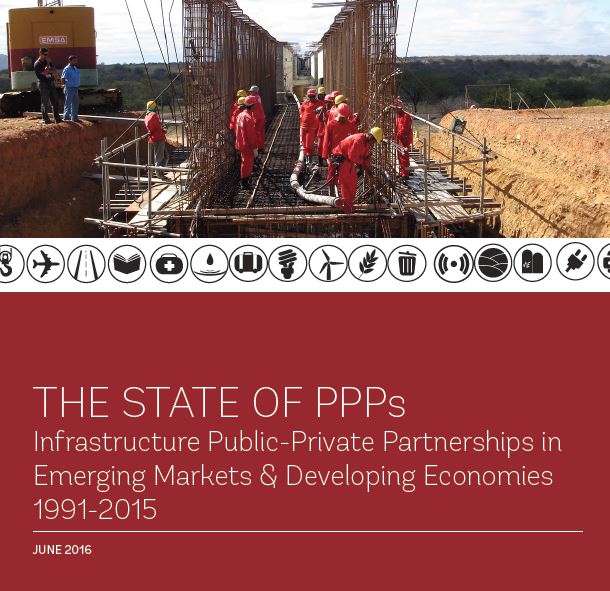Publications
Filter by
539 results found
This report looks into developing policies for Angola in the energy, water, transport and communcations sector in order to enhance the private participation in the rebuilding and development in the countries infrastructure.

This paper examines the evolution of infrastructure and the impact of infrastructure investment and public finance shocks on key development indicators and growth performance in the context of middle income countries.

The ITF Transport Outlook provides an overview of recent trends and near-term prospects for the transport sector at a global level as well as long-term prospects for transport demand to 2050.

This report assesses infrastructure PPP investments in an expanded list of Fragile and Conflict Affected States (EFCS2), as well as the PPP regulatory frameworks during the 2012-2016 period.

This report uses data from the PPI Database to analyze broad trends of PPP investment in infrastructure from 1991 to 2015.


The 3PA consists of three pillars each of which represents a key dimension of quality project assessment providing a clear framework within which project proposals can be evaluated.

This paper summarizes and expands the state-of-the-art understanding of the urbanization, development, environment, and inequality nexus.


This paper proposes the adoption of advanced asset management practices that could help water and wastewater utility operators to improve their competitiveness and become more sustainable in operational terms.

This publication is the result of a scoping study initiated by the Asian Development Bank to better understand the issues associated with the water-food-energy nexus in Asia and the Pacific.

Population growth and economic development, aggravated by climate change, will increase pressure on energy and water resources. Integrated planning can make the most of these two essential and scarce resources. Thirsty Energy, a World Bank initiative, helps countries address these issues and ensure sustainable development of both resources. This note focuses on the water needs of the power sector and particularly answers the following questions: Why is this issue important? Do power plants need all that much water? What about other types of plants? What are the challenges? and, What are our options?


This tool presented here in an Excel format was designed to evaluate the fulfillment of good corporate governance practices in primarily state owned water and sanitation companies in the region.


The Toolkit is a reference guide for public authorities in developing countries for the development of PPP programs in the highways sector, particularly in assisting in PPP policy development, project preparation and the sourcing and more.

This is a self-learning tool for city transport leaders and their advisers, but also a public resource that provides guidance in the planning, design, implementation, and evaluation of an ITS program.


This toolkit outlines a spectrum of tools that can help the countries navigate the evolving architecture of climate finance and seize opportunities for accessing finance for adaptation.


This toolkit is a resource designed to assist practitioners working on the next generation of PSP contracts for smaller water projects.

The purpose of the present publication, Towards better infrastructure products: a survey of investor s perceptions and expectations of infrastructure investment , is to conduct the first in-depth study of the perceived role by infrastructure assets for investors.


The purpose of the present publication, “Towards better infrastructure products: a survey of investor’s perceptions and expectations of infrastructure investment”, is to conduct the first in-depth study of the perceived role by infrastructure assets for investors.





This paper from EDHECinfra explores how institutional investors should incorporate ESG elements into the financial management of their portfolios.



